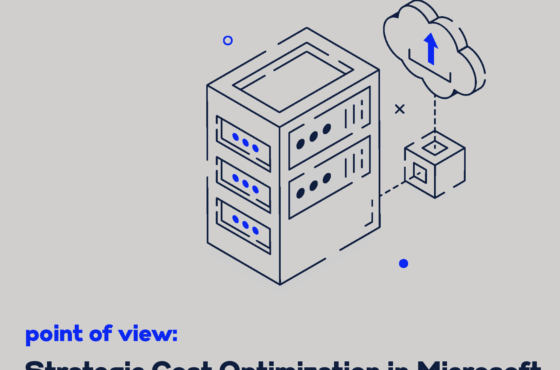Protecting Your Business from Cyber Fraud: Best Practices for IT Security
November 13, 2024
Products and Services | Customer Stories
Imagine your company's CFO reviewing your pending receivables and seeing your top customer on the list. They have never missed a payment or even been late. She calls the customer, and they tell you they paid the company $4 million dollars last week and even sends her the email “from her” asking for the bank account information to be changed. This, unfortunately, is not a fictional story but a real-world example of cyber fraud.
As we observe International Fraud Awareness Week, I want to share some insights on protecting your business from the growing threat of fraud. In today's digital landscape, a robust cybersecurity strategy is no longer optional—it's necessary for organizations of all sizes.
The Rising Threat of Cyber Fraud in Business
According to Cybersecurity Ventures, cybercrime damages are projected to reach a staggering $10.5 trillion annually by 2025, making it a top concern for businesses. Cyber fraud takes many forms, from data breaches and ransomware to phishing scams, social engineering, and insider employee threats. The impacts extend beyond just financial losses, often leading to reputational damage, eroded customer trust, and legal liabilities.
One of the biggest challenges is the rapid evolution of these threats. Attackers constantly refine their methods, making it difficult for companies to rely solely on traditional security measures. In my role with US Signal, I can work with many of our customers, and I've seen firsthand how these sophisticated attacks can catch businesses off guard.
Best Practices for Safeguarding Against Cyber Fraud
To stay ahead of cyber fraudsters, businesses must adopt a layered, proactive approach to security. Here are some key practices to consider:
1. Implement Multi-Factor Authentication (MFA)
MFA adds an extra layer of security beyond passwords, requiring users to provide two or more verification factors to access an account. This simple step can make it significantly more difficult for attackers to gain unauthorized access, even if they have obtained login credentials.
Another real-world example: A criminal gained access to the HR administrator's email and successfully stole an employee's bank account, social security, and other personal information that they used in their next crime. That company did not have MFA on their email.
2. Leverage MDR and MXDR Solutions
Managed Detection and Response (MDR) and Managed Extended Detection and Response (MXDR) services are essential for monitoring and securing devices and user accounts. These solutions provide round-the-clock monitoring, threat detection, and rapid incident response to contain attackers before they can inflict significant harm or steal data. Threat actors often strike when staffing is low, such as holidays, weekends, or after business hours. Ensure someone has eyes on your security 24x7.
3. Embrace Resiliency
In the event of a successful cyberattack, having regular data backups and a comprehensive disaster recovery plan can minimize the impact on your business. Backups allow you to restore lost data, while a well-designed recovery plan provides a roadmap for quickly getting your systems back online. Building resiliency into your business processes allows you to keep operating even when criminals strike.
4. Secure Your Cloud Environment
The reliance on SAAS-based apps has transformed businesses. We need to implement the same security controls on SAAS apps as on-prem systems. The focus should be on securing account access (with MFA), logging, encryption of data, and, most importantly, securing APIs that can access the SAAS app. API’s are an often forgotten about feature of cloud apps, but if not properly secured a criminal can use that API to insert an Invoice for payment into your cloud based ERP without ever having to socially engineer an employee.
5. Empower your Finance Team
Partner with your CFO and Finance team. Take the time to understand their processes and then help them build defenses to protect the business money supply. Finance teams are a prime target for fraud. Here are some actionable tips to support your finance team:
Verification Protocols: Establish multi-step or two-person verification processes for any requests involving financial transactions, especially those that involve changes in payment details, electronic fund transfers, or payroll information.
Employee Training: Regularly educate Finance employees about the unique social engineering tactics they face. Train your finance team to be extra vigilant, especially if a request is urgent or the requestor is overly demanding. Empower your Finance team with the authority and autonomy to confirm requests, even if they appear to come from executives, customers, or trusted vendors.
Use Callback Procedures:
Implement predetermined callback numbers for customers and vendors to verify requests, ensuring authenticity before any action is taken. This simple step can help prevent fraudsters from successfully impersonating legitimate business partners.
Check Your Insurance: Before you become a victim, engage with your insurance broker to ensure that cybercrime losses, such as those resulting from social engineering of payments and fund transfer fraud, are covered by your crime or cyber insurance policy. Having the right insurance coverage can provide a financial safety net in the event of a successful fraud attempt, helping your business recover more quickly.
Staying Ahead of Cyber Fraud: A Proactive Approach
A reactive stance is no longer sufficient. Businesses must take a proactive approach—continuously assessing their security controls, leveraging advanced detection and response capabilities, and prioritizing resilience to minimize the impact of successful attacks.
At US Signal, we're committed to helping organizations fortify their security posture. Our state-of-the-art infrastructure and expert guidance can help you build a resilient, adaptable security framework to stay ahead of evolving cyber fraud threats.
This International Fraud Awareness Week, I encourage you to assess your cybersecurity strategy and take proactive steps to safeguard your business. By implementing these best practices and partnering with a trusted provider like US Signal, you can better protect your valuable assets and maintain the trust of your customers in the face of ever-present cyber threats.


